#NoGreyAreas - Consent & Relationships
PLEASE NOTE: the topics discussed on this page can be potentially triggering and upsetting for some individuals. If you are feeling vulnerable at the moment, you may want to have someone with you for support or you may not want to read the following page. The information below has predominantly been gathered from the Disrespect Nobody website. Click here to visit their page and for more information.
Here at HoW we strongly believe it's important to teach those within our community what consent is, as well as discussing the various aspects of healthy relationships. We do this with our students via campaign weeks and talks each year; however, we wanted to create a landing page that could be permanent point of reference. Below, you will find information surrounding what consent is, what does and does not contribute to a healthy relationship, assault, harassment and abuse, sexting and online pressures, and how to support and report those who need it.
Consent: What Is It?
According to Disrespect Nobody, consent means giving permission for something to happen or agreeing to do something and being comfortable with that decision. It doesn’t matter what gender you are, or whether you’re straight, gay or bisexual; if you’re planning to do anything sexual then both of you must give consent.
Consent has to be given freely and no one can be made to consent to something. It’s not consent if someone does something because they feel like they have to. You can also never assume that someone is giving consent – you have to be sure. Both you and the person you’re with always need to consent before sex or any intimate activity.
If you want to do something sexual with your partner, the responsibility lies with you to check for consent, not with your partner to say ‘no’ if they don’t want to.
The Statutory Definition of Consent
Section 74 of the Sexual Offences Act 2003, defines consent as “if s/he agrees by choice, and has the freedom and capacity to make that choice”. Two areas which must be considered with consent are:
- Whether a complainant had the capacity (i.e. the age and understanding) to make a choice about whether or not to take part in the sexual activity at the time in question.
- Whether he or she was in a position to make that choice freely and was not constrained in any way.
Consent: What Means Yes and What Means No?
Below, you will find clear-cut examples on what does and does not represent consent.
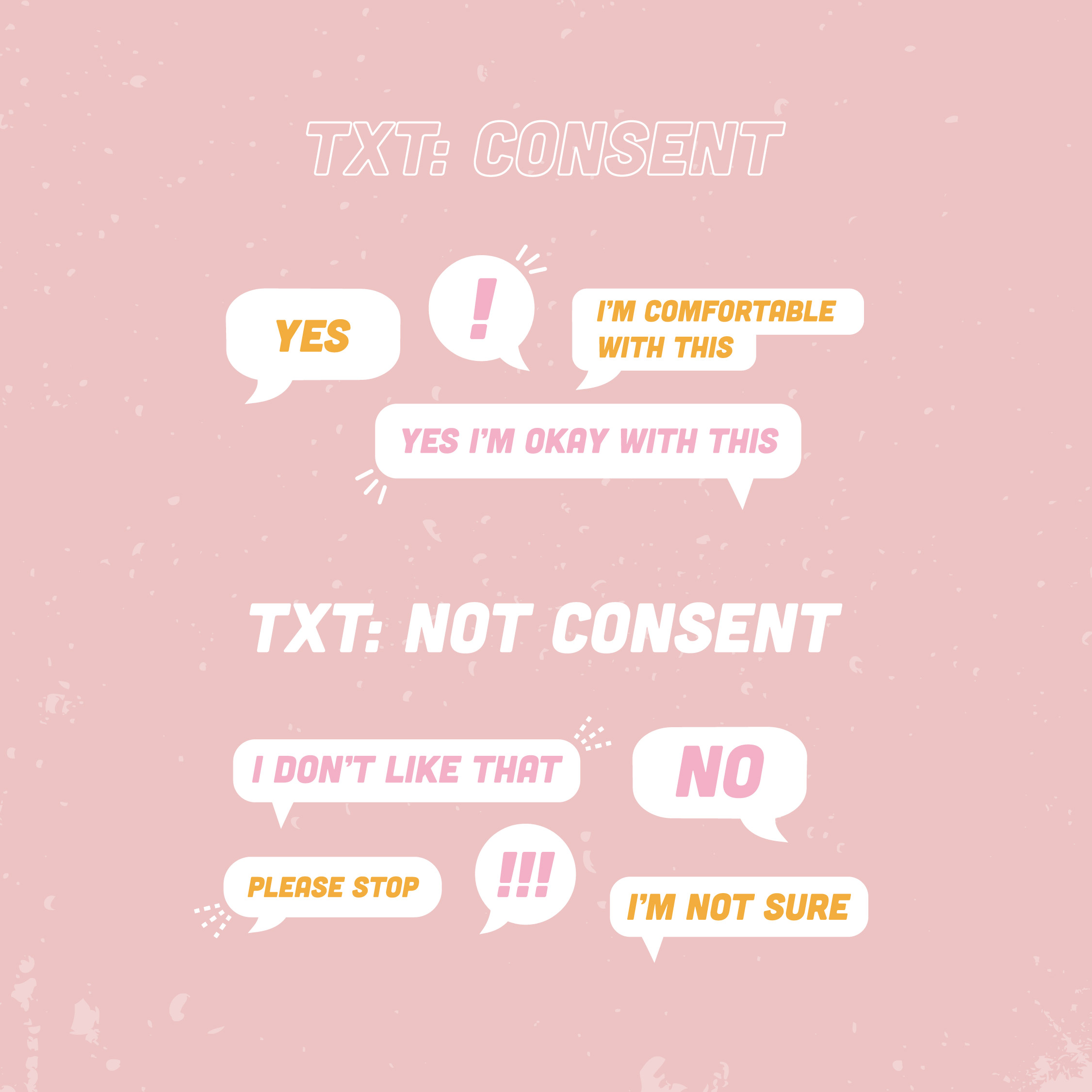
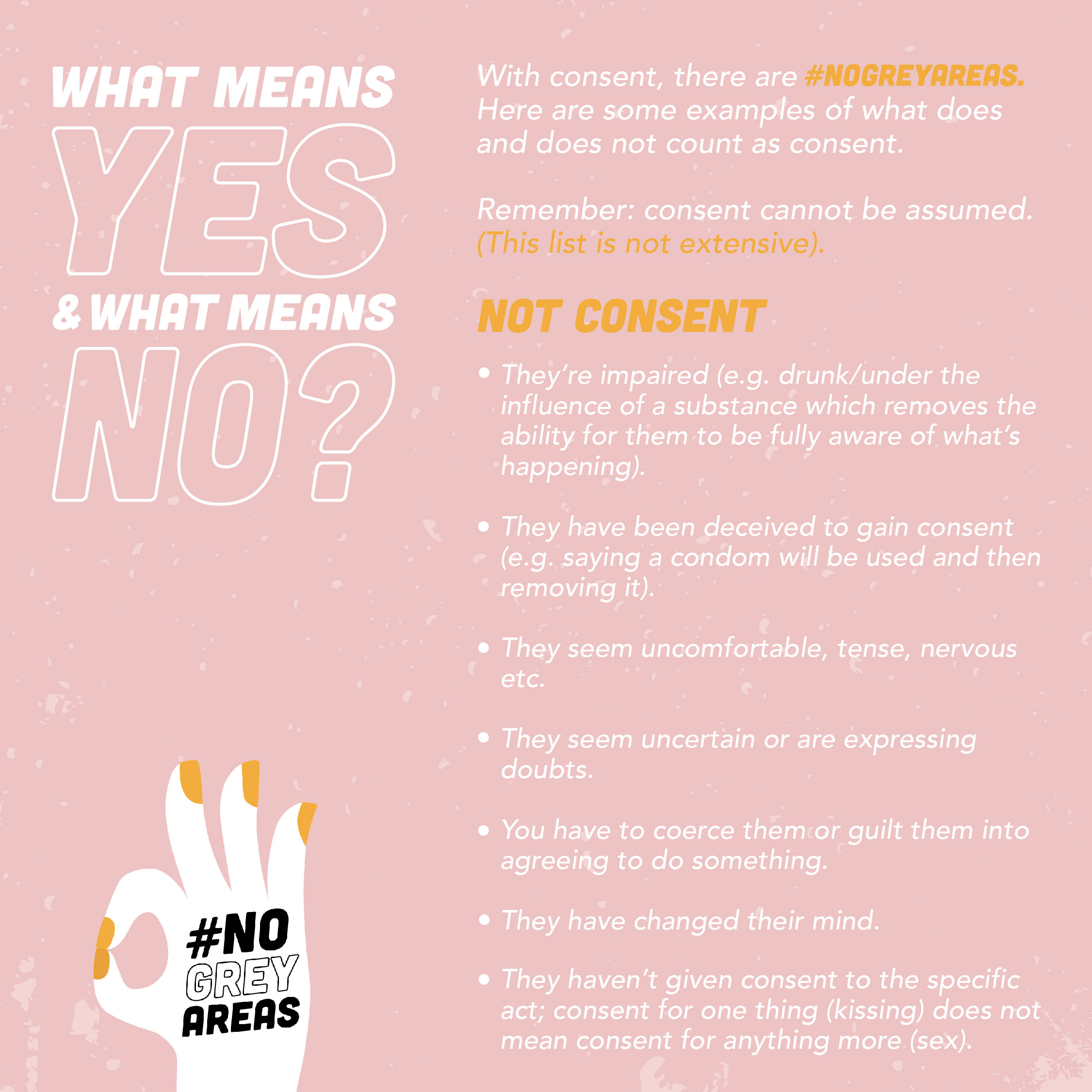
Consent: Things to Remember
There are several things to remember when seeking consent; it should be freely given, informed, ongoing and reversible, specific, and enthusiastic. Click on the drop down boxes below to hear more about each of these elements within consent.
Freely Given
Consent should be FREELY GIVEN. An individual should NOT have to be pressured or manipulated into saying yes. Examples of pressured consent ( NOT FREELY GIVEN) are as follows:
- Saying yes after being made to feel stupid or bad for saying ‘no’
- Being made to feel you have to
- Being pressured verbally, e.g. by being called frigid or saying ‘if you loved me you would’
- Being encouraged to drink lots of alcohol or take drugs to make you more likely to have sex
- Being made to feel bad for changing your mind after initially saying yes
- Being pressured into something to ‘prove’ yourself, e.g. doing something to demonstrate you are or are not lesbian, gay, bi, or transgender
Informed
Consent should be INFORMED. An individual should not be lied to or deceived when seeking consent. For example, stating you will wear a condom and then removing it is not fully informed consent.
Ongoing and Reversible
Consent should be ONGOING AND REVERSIBLE. Anyone should be able to change their mind about what they’re doing at ANY time. It does not matter if the initial answer was yes.
Specific
Consent should be SPECIFIC. Each act requires consent, as saying yes to one thing (such as kissing), does not equal automatic consent for any other form of sexual act. You must never assume that consent for one thing means yes to anything else.
Enthusiastic
Consent should be ENTHUSIASTIC. An individual should want to do something and not feel pressured or as though they have to do it. If you're not sure that someone is enthusiastic/certain they want to do something, then that probably means they don't want to and should not be pressured.
Respect and Healthy Relationships
Respect is always an important element of maintaining any form of relationship, especially romantic relationships. Without respect, romantic relationships can become difficult, upsetting, and sometimes even abusive.
According to the Cambridge English Dictionary, respect (in the given context) refers to “politeness, honour, and care shown towards someone or something that is considered important.” This means that you show consideration towards an individual and do not wish to cause them upset, harm or discomfort.
Romantic relationships require emotional respect, physical respect and sexual respect. Each individual person will have their own boundaries when it comes to their emotions and body, meaning that just because you may find something you say or a way in which you behave acceptable, doesn’t mean somebody else will. This is why consent and having open discussions within relationships are so important, as this can help us identify each other’s boundaries and in turn, help us understand how to respect them.
If someone is in a healthy, happy and respectful relationship, they may feel happy, secure, confident, free to be themselves and in love. The below infographic demonstrates the features which make a healthy and respectful vs and unhealthy and disrespectful relationship. (The examples below are by no means extensive).
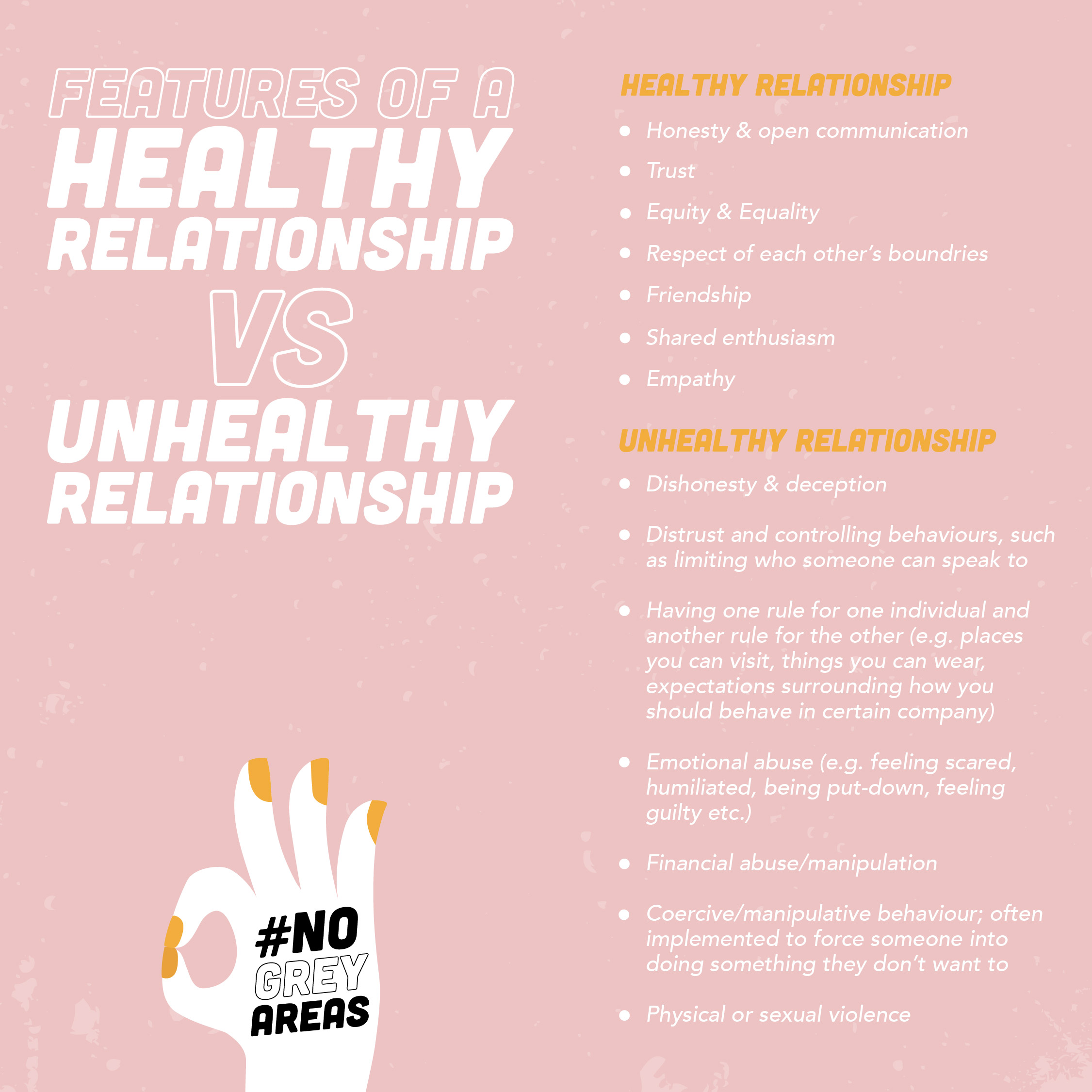
Controlling behaviours can often be a form of relationship abuse and disrespect, which may otherwise go unnoticed by those outside of the relationship because it’s not always a physical occurrence. Someone can be considered to be controlling if they are trying to force another individual to behave, speak, dress etc. in a certain manner.
A normal “healthy” disagreement can (and will) often take place in many relationships, where both individuals can discuss a disagreement they may be having, share their opinions, and make compromises to ensure both parties are happier moving forwards; there should not be a “winner” in such scenarios.
Below are some examples of controlling behaviours which are not part of a healthy relationship and can be considered abusive (this list is not extensive):
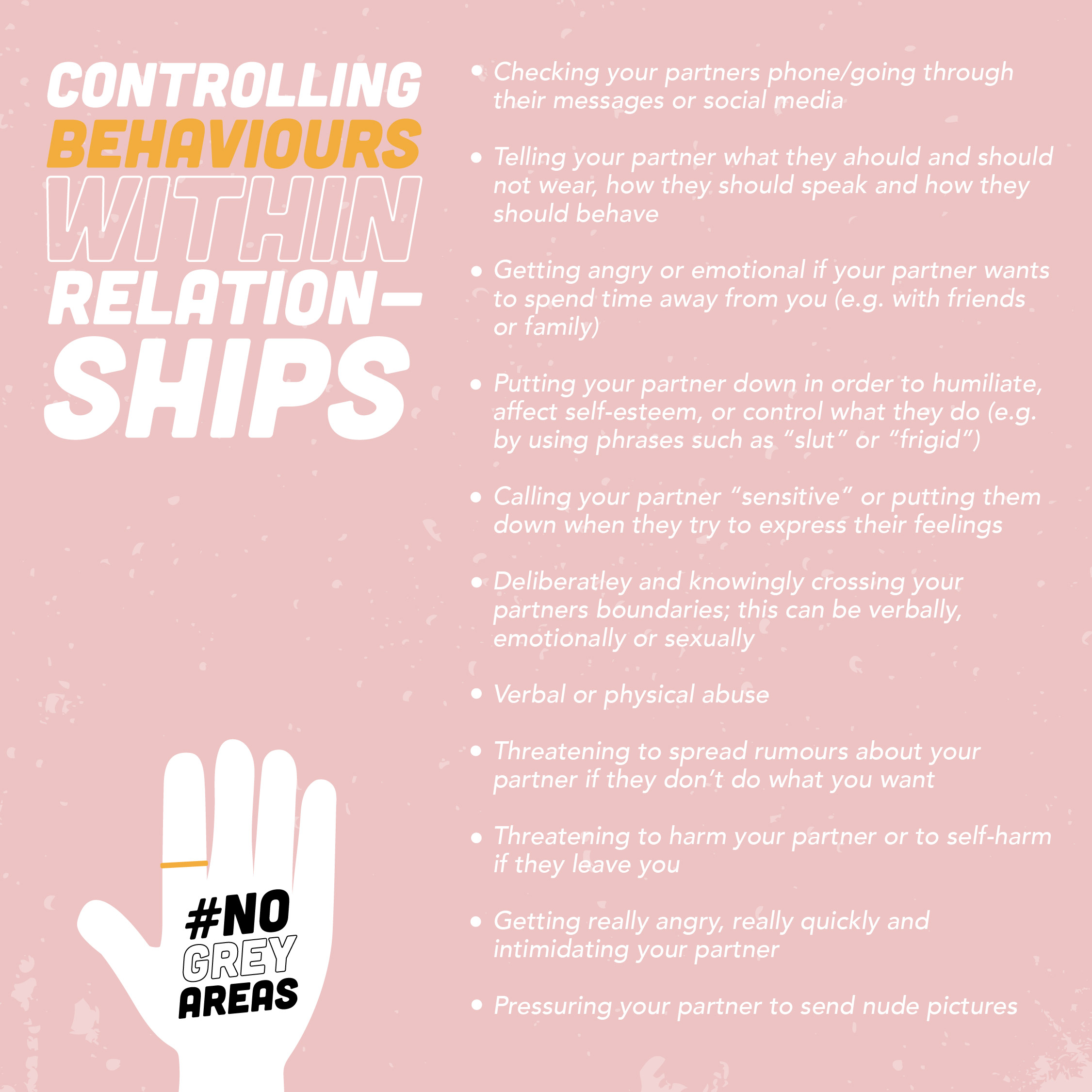
There are occasions when people may not recognise their behaviour/language as being harmful or upsetting; this sometimes may happen during the early stages of a relationship when getting to know each other and when establishing boundaries. However, if you feel as though you’re too scared to talk about your boundaries through fear of how your partner may react, or you have tried to express yourself previously and the behaviour continues, then this is not respectful nor healthy. If you recognise any of the occurrences in the above list as taking place in your own relationship, you can click here to read about further support.
Assault, Harassment and Abuse
PLEASE NOTE: the topics discussed in this section can be potentially triggering and upsetting for some individuals. If you are feeling vulnerable at the moment, you may want to have someone with you for support or you may not want to read the following page. Please see the bottom of this page for further support resources.
Unfortunately, assault, harassment and abuse can take place within relationships, as well as outside of relationships. Many also think that assault, harassment or abuse can only take place physically, but as we saw above, this is not the case; all can occur physically, verbally, mentally, sexually, culturally and financially.
Assault, harassment and abuse can all take place as a result of someone’s age, gender, sexual orientation, race, religion or disability being targeted. Incidents can occur as a one-off, or in an ongoing capacity; either way, they can still be considered assault, harassment and/or abuse. Click on the boxes below to read the definitions of the given terms.
Assault
(According to Merriam-Webster) “a violent physical or verbal attack.”
(According to The Crown Prosecution Service/CPS) “An assault is any act (and not mere omission to act) by which a person intentionally or recklessly causes another to suffer or apprehend immediate unlawful violence.”
Harassment
(According to Citizens Advice) “Harassment is unwanted behaviour which you find offensive or which makes you feel intimidated or humiliated. It can happen on its own or alongside other forms of discrimination. You do not need to have previously objected to something for it to be unwanted.”
Abuse
(According to the Cambridge English Dictionary) “the cruel, violent, or unfair treatment of someone.” This can take place in a physical, verbal/emotional, mental, financial, cultural or sexual capacity.
It is important to remember that it is not up to you to decide what is and is not acceptable for somebody else. Just because you haven’t hit someone, used provocative language, or raped someone, does not mean that you are not being abusive. If somebody tells you they are not happy with how you’ve spoken or behaved towards them, then it is important for you to listen, acknowledge, apologise, and make sure you do not repeat the behaviour. This will keep everything consensual and respectful.
Below, you will find examples of assault and harassment. Some examples overlap and can come under multiple categories. (These lists are by no means extensive).
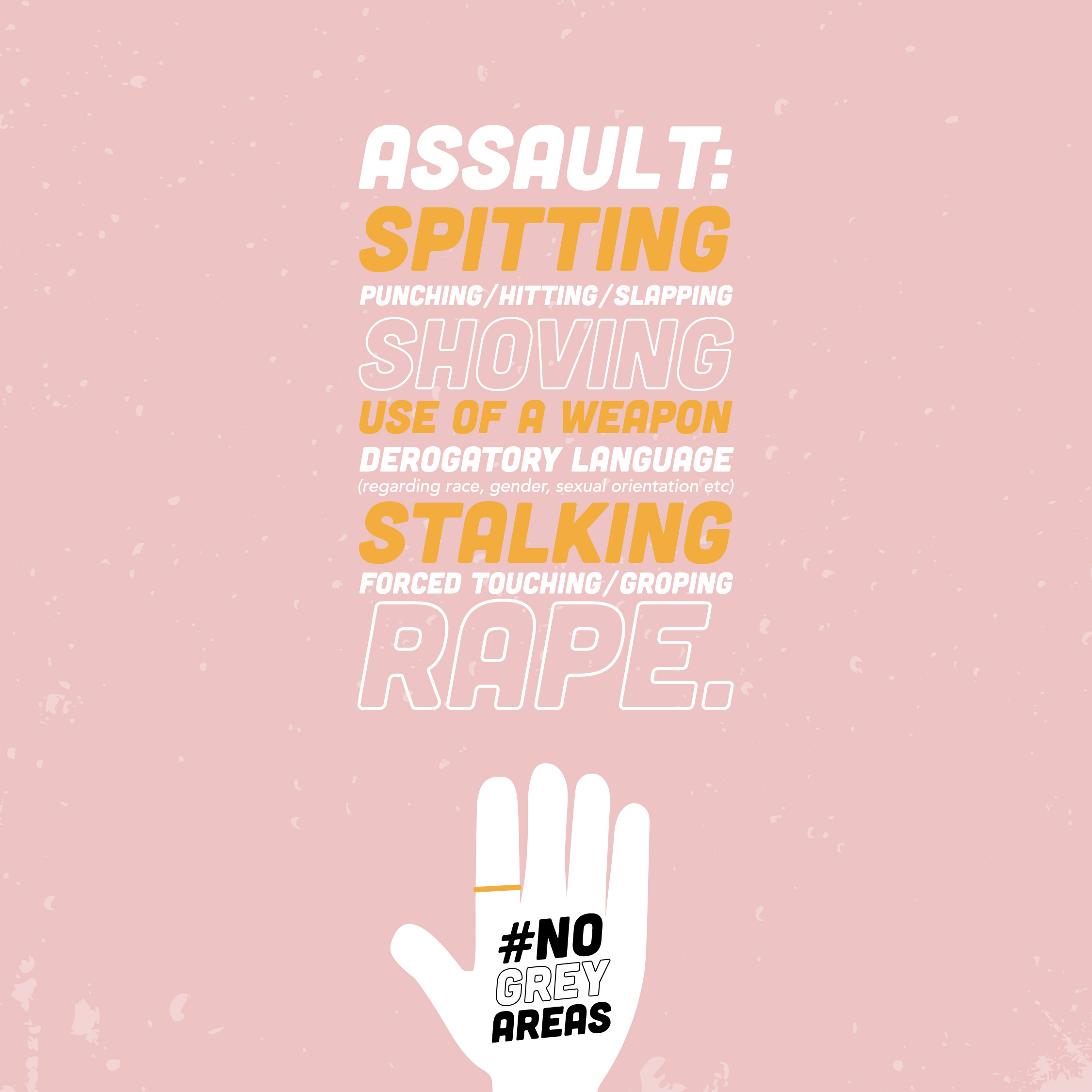
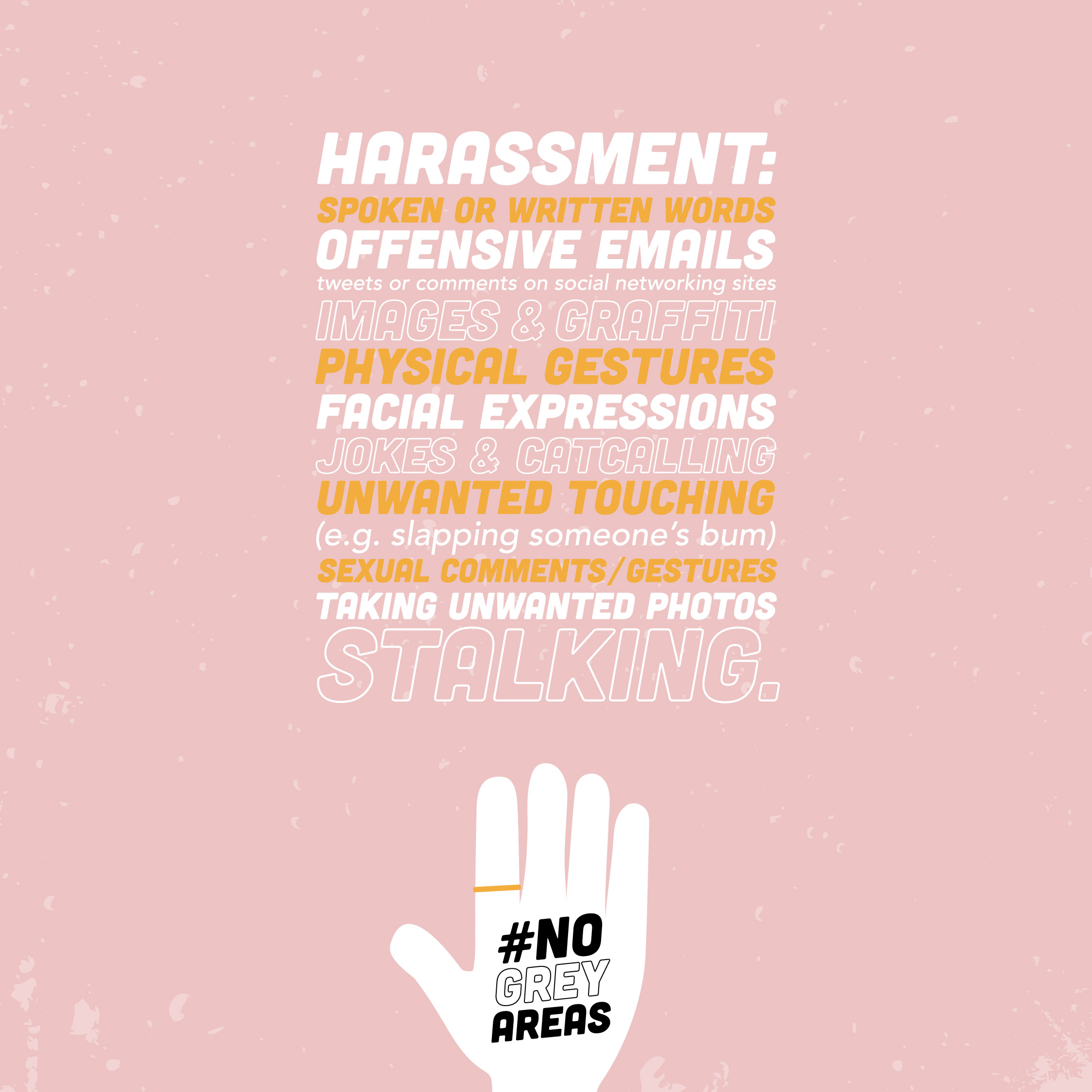
If you feel you may have experienced/be experiencing any of the examples listed above, please visit the bottom of this webpage to see a list of help resources.
Sexting and Online Pressures
Many people think that sexual abuse and harassment can only take place in a physical capacity, but this isn’t true. Social media and mobile phones are such a huge force nowadays and whereas they come with a lot of positives, they can come with a lot of negatives too, particularly when it comes to relationship-based pressures. The Disrespect Nobody website looks specifically at the act of sexting, signs that you’re being pressured to sext, and potential consequences of sexting. We wanted to take the time to share such information and highlight potential warning signs that you (or someone you know) may be being mistreated.
According to Disrespect Nobody, “Sexting is when someone sends or receives a sexually explicit text, image or video. This includes sending ‘nude pics’, ‘rude pics’ or ‘nude selfies’. Pressuring someone into sending a nude pic can happen in any relationship and to anyone, whatever their age, gender or sexual preference.” Whereas sexting may sound as though it only takes place via text, this can take place over other platforms such as Snapchat, Messenger, Instagram and Twitter too.
Below, you will see some examples of signs that indicate you're being pressured into sexting.
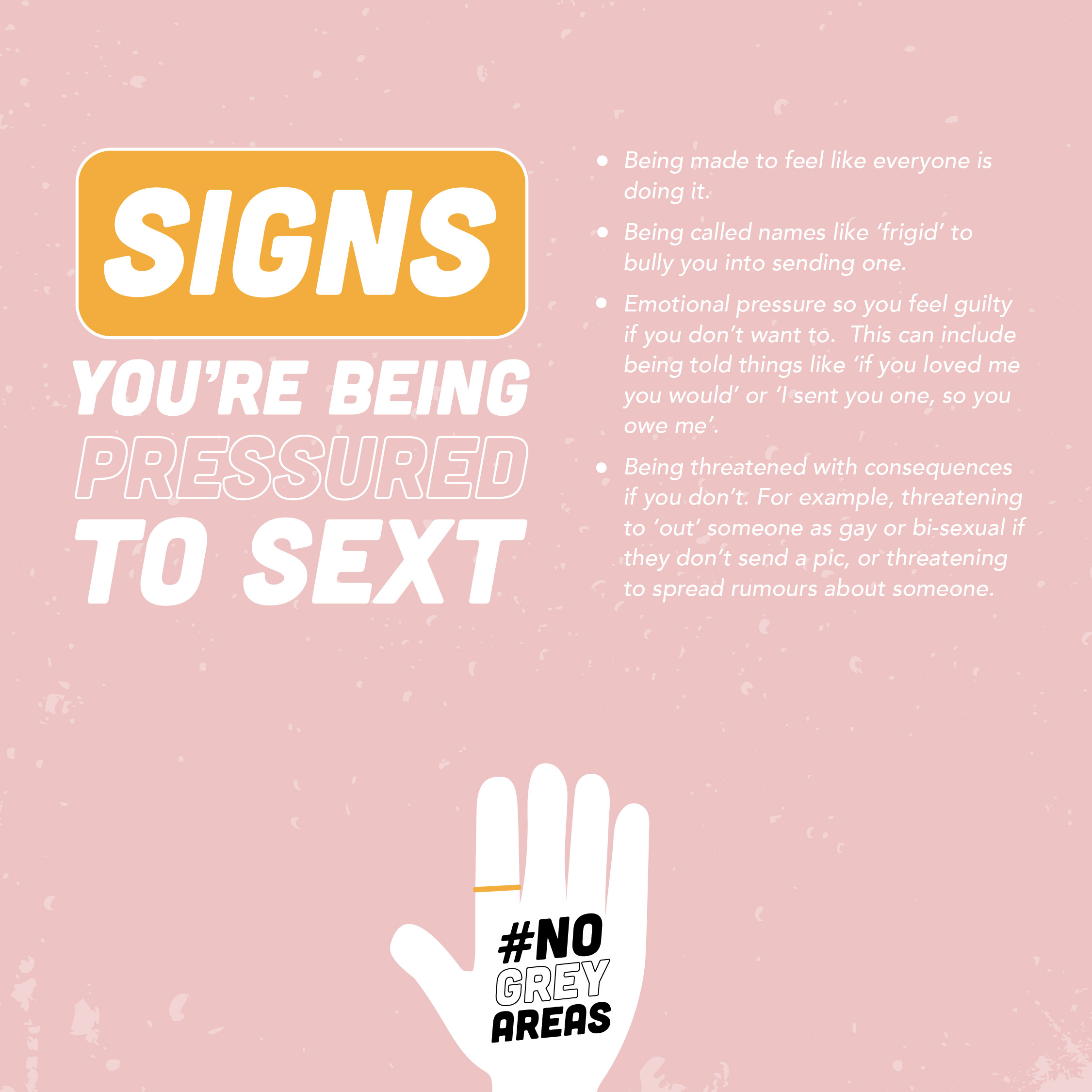
Legal Consequences of Sexting - Taking, possessing or sharing a sexually explicit picture or video of someone under 18 is against the law. It doesn’t matter if they gave you permission, someone else sent it to you, you’ve never met them before, you are under 18 too or it’s a selfie. You and anyone else involved could be investigated by the police, and this could even affect your future education and employment.
If you are over 18 and you send an image of yourself to someone who is also over 18, this is not a crime. However, you should not share anyone else’s nude pictures, even if they are 18+. If you forward a nude or sexually explicit picture or video of someone without their consent, you’re breaking the law and taking part in abuse that could cause them serious distress.
Potential Repercussions of Sexting: ‘Once it’s gone, it’s gone’ - When you share a picture or video online or on your phone, you lose control of it. Pictures can be quickly shared over the internet and once somebody else has it they can send it to anyone, such as friends, family, teachers, employers etc. You may feel as though you can trust whoever you’re sexting, but unfortunately there might be a time in future where they aren’t so trust-worthy.
Potential Repercussions of Sexting: Blackmail – If you send a picture you wouldn’t want other people to see, then you could be in danger of being blackmailed. The person who received it might threaten to share the photo unless you send them more or do what they ask of you. If you are gay or bi-sexual, this could include threatening to ‘out’ you, or you could experience homophobic or bi-phobic bullying, along with the humiliation of the image being shared.
For more information and support specific to sexting, click here.
How to Support & Report
There are many ways in which we can show support for others when they need someone to confide in. However, it can be very tricky when the support needed revolves around relationship/sexual abuse, harassment and assault. If you feel you are able to listen and offer support, you might want to remember the following pointers to help navigate difficult conversations/scenarios:
Be Present
Turn off your phone, be attentive, and give your full attention to whoever is wanting to speak to you. It can be very disheartening to think somebody isn't interested in what you have to say because they're too busy with something else, so make sure you're engaged in the conversation taking place.
Be Patient
It can take a little while for someone to find the right words to express what may have happened or how they’re feeling. Try not to finish their sentences or speak for them; be patient and give them extra time if they need it.
Be Empathetic
The individual may feel embarrassed, ashamed, worried, overwhelmed, etc. Try to imagine how you may be affected if you were in their shoes and avoid brushing the situation off/playing it down.
Appreciate how difficult speaking up can be
It’s not easy to ask for support and to speak out about such significant scenarios. Some may find it difficult to fully explain what has happened or it may take a while to establish what steps they would like to take. Remember this is not an easy situation and it shouldn’t be treated like “it’s no big deal”.
Ask how they need you to support them
Often, it’s human nature to try and solve a problem and offer advice, but sometimes this can be unhelpful, unwanted, or undermining to someone’s feelings. The best course of action is to directly ask how someone needs you to support them. Do they just need someone to listen? Do they want someone to help them find the right means of support? Asking can help make sure everyone is on the same page and allows everyone to make informed decisions about whether they feel prepared to be part of the discussion/support.
It is important to remember that if the subject at hand is triggering for yourself or you feel you aren’t equipped to handle what you’re being told, there are numerous professional resources which you can signpost people to in order to gain help. If you or someone you know may need professional support as a result of relationship abuse, take a look at the resources below for further assistance.
Remember: if you are in immediate danger you should always call 999. If you're deaf or hard of hearing, contact the Police textphone service using 18000. If you cannot talk on the phone, any member of the public can also text the Police using 999 in an Emergency situation; however, you must register for this service first. Register today by texting ‘REGISTER’ to 999 and follow the instructions.
Support Resources
Below, you will find several lists with support resources tailored to different demographics, including children, men, women, LGBTQ+ and general, all-encompassing resources (including ones for individuals who feel they may be abusing their partner).
General
Respect Phoneline - If you are abusing your partner, you can stop and get help to change your behaviour. There are trained advisors who can provide help and support to men or women who are abusing their partners. https://respectphoneline.org.uk/
Live Fear Free Helpline - If you are experiencing domestic abuse or sexual violence and live in Wales, you can contact the Live Fear Free Helpline. The Helpline provides a bilingual information service that helps and guides people who are victims of abuse, and are in need of information or access to support services. This service is also available to those who are worried about a friend or relative and need advice.
Victim Support: Sexual violence services - We know that victims of rape and sexual violence often prefer not to report their experiences, for a variety of reasons. In addition, victims of female genital mutilation and ‘honour-based’ violence and coercion may be afraid to report the crime for family or cultural reasons. So, we work with local police forces and strategic partners to encourage reporting, and to ensure that victims who come forward get support that’s tailored to their individual needs and circumstances. https://www.victimsupport.org.uk/
NHS: Help after rape and sexual assault – this webpage offers advice and support for those who may have suffered rape or sexual assault. https://www.nhs.uk/live-well/sexual-health/help-after-rape-and-sexual-assault/
Children
Childline - Childline provides free confidential advice and support for all young people up to 19 years old. Whatever your worry, Childline counsellors are here to help. Speak to them by phone, online or email 24 hours a day. https://www.childline.org.uk/
Thinkuknow - If someone has asked you to do things online that you don’t feel comfortable with, Thinkuknow offers advice to young people on sex, relationships and staying safe online. It may be talking about sex, asking you to send nude photos of yourself, or pressuring you to meet in real life, you can report this using their online Child Exploitation and Online Protection (CEOP) ‘Report it’ button. They’ll ask for information about you and what’s happened, which will help them to understand more about the situation and keep you safe. You can also report to CEOP if you are worried about a friend, or someone you know. https://www.thinkuknow.co.uk/
NSPCC – The NSPCC helpline is staffed by trained professionals who can provide expert advice and support. We’re here if you’re concerned about a child, if you’re a parent or carer looking for advice, or if you’re a professional in need of information and guidance. Whether you need help yourself or you’re worried about someone else who might need help, the NSPCC can offer support. https://www.nspcc.org.uk/
Women
National Domestic Violence Helpline, run in partnership between Women’s Aid and Refuge - If you are a girl who is experiencing violence, or has experienced it in the past, the National Domestic Violence Helpline can support you. The Helpline is staffed by fully-trained female support workers who can provide confidential, non-judgmental emotional support and information on a range of issues – from reporting to the police, to accessing local services in your area. All calls are confidential. You can also call them if you are worried about a friend or someone you know. https://www.nationaldahelpline.org.uk/
Rape Crisis- If you are a girl who has experienced rape, sexual abuse or sexual assault you can get help, information and support from trained female support workers via their helpline. They will be able to tell you details of your nearest support services. They also provide information for partners, family, friends and other people who are supporting a survivor of sexual violence. You can get more information on their website. https://rapecrisis.org.uk/
Southall Black Sisters - If you are a woman or child who is Asian, African-Caribbean or other minority, and you are experiencing domestic or sexual violence (including forced marriage, dowry abuse and honour crimes). Southall Black Sisters provides information, advice, advocacy, practical help, counselling and support in English, Hindi, Punjabi, Gujarati and Urdu (Interpreters are used for other languages). https://southallblacksisters.org.uk/
IKWRO - If you are a female from a Middle Eastern, North African or Afghan community, IKWRO can help you if you are at risk of “honour” based violence, forced marriage, female genital mutilation and violence. They provide confidential advice, advocacy and make referrals to ensure needs are met as well as offering professional individual and group counselling. They speak Farsi, Arabic, Kurdish, Dari, Pashto, Turkish and English. http://ikwro.org.uk/
Men
The Men’s Advice Line - If you are a boy who is experiencing abuse, or have in the past, you can speak to trained advisors who provide support specifically for men experiencing violence from their partners, and who can offer you emotional support and practical advice.
All calls are confidential. https://mensadviceline.org.uk/
Safeline - Safeline provide a range of services to support men in working through their experiences, including free online and telephone counselling. Safeline has over 20 years’ experience in working with rape and sexual abuse and our research shows that the clients we work with report a significant improvement in their mental health and wellbeing, enabling them to regain control of their lives and play a more active role within their communities. https://www.safeline.org.uk/what-we-do/men/
Survivors UK - If you are a man over the age of 18 and have experienced rape or sexual assault you can get help and advice from specialists in the field of male sexual violence who have helped many men to work through their experiences. https://www.survivorsuk.org/
LGBTQ+
Galop - The Galop National, Lesbian, Gay, Bisexual and Trans Domestic Abuse Helpline: Provides confidential and specialist telephone and WebChat service for all members of LGBT communities, their family, friends and agencies supporting them who have experienced issues with domestic violence and abuse. Domestic abuse can be psychological, financial, sexual, physical and/or emotional. Need support? We’re here to help. http://www.galop.org.uk/domesticabuse/
Switchboard LGBT+ Helpline - At Switchboard we provide an information, support and referral service for lesbians, gay men and bisexual and trans people – and anyone considering issues around their sexuality and/or gender identity. https://switchboard.lgbt/how-we-can-help







